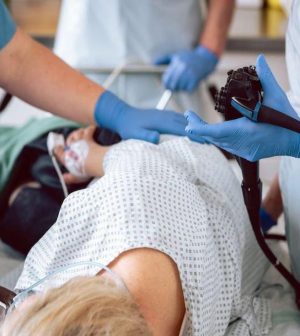- Recognizing the Signs of Hypothyroidism
- 10 Strategies to Overcome Insomnia
- Could Artificial Sweeteners Be Aging the Brain Faster?
- Techniques for Soothing Your Nervous System
- Does the Water in Your House Smell Funny? Here’s Why
- Can a Daily Dose of Apple Cider Vinegar Actually Aid Weight Loss?
- 6 Health Beverages That Can Actually Spike Your Blood Sugar
- Treatment Options for Social Anxiety Disorder
- Understanding the Connection Between Anxiety and Depression
- How Daily Prunes Can Influence Cholesterol and Inflammation
Could Home Test for Colon Cancer Mean a Big Medical Bill to Come?

You decide to take a popular colon cancer screening test that can be performed at home, and it comes back positive. A follow-up colonoscopy is scheduled, but then you suddenly receive a large and unexpected medical bill.
That’s what happened to a Missouri woman who was hit with $1,900 in medical expenses after using the popular at-home colon cancer screening test called Cologuard.
Before using the test, Lianne Bryant checked with her insurance company and was told the test would be fully covered, CBS News reported.
The Cologuard test came back positive, so Bryant had a follow-up colonoscopy, which was negative. But then, “I start getting statements from my hospital saying that I have a balance of $1,900,” Bryant told CBS News. “I’m thinking, well, I certainly don’t owe that much. I mean, that’s not possible.”
Under the Affordable Care Act, only routine screening tests are covered. Because Bryant’s Cologuard result was positive, her follow-up colonoscopy was classified as a “diagnostic” test, which was not fully covered by her insurance. She would have been fully covered had she not used Cologuard first.
“I am mad because I pay so much every month for this insurance,” Bryant told CBS News. “I just feel like I’m really getting raked over.”
Luckily, Cologuard has a program to help people file an appeal if they get an unexpected bill for a follow-up colonoscopy. Bryant did win her appeal, but it took five months to get it resolved.
While TV ads for Cologuard say the cost of the test is covered by most insurance policies, they don’t note that a follow-up colonoscopy may not be covered, CBS News reported.
Bryant said she wished those ads had given her some warning.
“I don’t want to say it’s a sham, but in a way, it’s just kind of taking advantage of people. If it happened to me, I know that it’s going to happen to a lot of people,” Bryant said.
Cologuard is sold by Exact Sciences. Chairman and CEO Kevin Conroy acknowledged there’s a problem and told CBS News the company has added new language to its website that says, “Millions of patients have access to this follow-up colonoscopy with no out-of-pocket cost, but not all do.”
CBS News surveyed 11 of the largest health insurers in the United States to see what they would do in situations like Bryant’s. Seven did not respond. The four who did said coverage decisions vary, and how much a consumer will pay depends on how doctors code the colonoscopy procedure.
Experts say Cologuard is a good screening tool, but unfortunately, “in some cases, people with a positive, noninvasive test like Cologuard will have to pay out of pocket to get their colonoscopy,” University of Michigan’s Dr. Mark Fendrick, who studies medical service pricing, told CBS News.
That could lead some people to pass on a colonoscopy, even if they have a risk of colon cancer, he noted.
“The fact that the people who are deemed to be at higher risk, that it’s not easy financially or otherwise to get the colonoscopy, makes absolutely no sense to me,” he told CBS News.
More information
Visit the American Cancer Society for more on colon cancer.
SOURCE: CBS News
Source: HealthDay
Copyright © 2026 HealthDay. All rights reserved.










